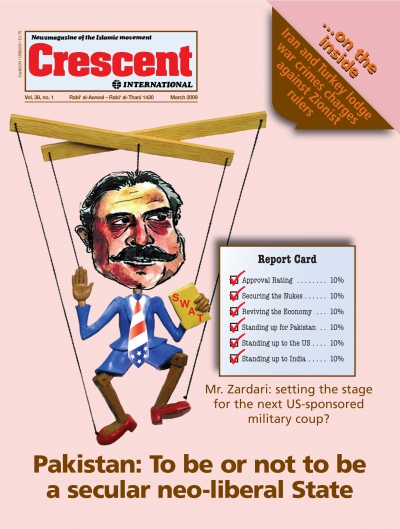Crescent International Vol. 38, No. 1
Newsmagazine of the Islamic movement
Zafar Bangash, Afeef Khan, Muhammad H. al-'Asi
Rabi' al-Awwal, 1430 2009-03


Will the deal announced on February 16 in Swat bring peace to the troubled region that has been engulfed in violence for nearly two years now? More importantly, will it hold considering that it was criticized even before all the details were known? Both the US and its agents in Pakistan have launched a vicious campaign, raising the specter of a Taliban takeover of the rest of the country as well.

March 23 is an important landmark in Pakistan’s history. It was on this date in 1940 that the All-India Muslim League passed a resolution in Lahore demanding a separate homeland for the Muslims of India. Within seven years Pakistan emerged on the world map as an independent state.

Iraq and Afghanistan were far from the only victims of the neo-cons’ aggression under George W. Bush. Several other Muslim countries suffered grievously too, without receiving nearly as much attention in the world media, and, by extension, among Muslims. Somalia is perhaps the single greatest example. Crescent has covered developments there as best we can, largely thanks to M. A. Shaikh, who writes on the new government of Sherif Sheikh Ahmed in this issue, but elsewhere in the Muslim media Somalia has been largely ignored.

Even while the economic tsunami hit the US, George Bush insisted that economic fundamentals were strong. When asked about the collapsing US economy at his last press conference as president, he replied, “I am not an economist; neither are you, by the way. I am an optimist and I believe the economy will eventually turn around.”

By challenging Israeli President Shimon Peres in Davos on January 29, Turkish Prime Minister Recep Tayyip Erdogan captured the imagination of millions of people, especially Muslims, around the world. His 56-word response to Peres echoed globally: “You are older than me and your voice is very loud. The reason for your raising your voice is the psychology of guilt. I will not raise my voice that much.

The Obama administration is off to a sluggish start in foreign policy. The strategic toxins that have been lodged in the organs and tissues of the American body politic throughout the previous decades of successive administrations are pathological and substantial. When it comes to dealing with the Islamic movement and State, American politics are downright malignant and cancerous.

When it comes to treating human beings like cattle, or worse, the Thai military does it best. Last December, thousands of Rohingya Muslims from Bangladesh and Myanmar, desperate to flee their squalid and miserable conditions, decided to jump into boats and migrate to neighboring lands. The Indian navy eventually found them near the Andaman and Nicobar Islands.

Representatives from nearly 55 countries will convene in Tehran in early March to help lodge a case for war crimes committed by Israel in its war on Ghazzah. Iranian Prosecutor General Saeed Mortazavi announced early last month “the summit will explore legal and judicial ways for an international investigation into acts of genocide and crimes against humanity that Israel committed in the Gaza Strip.”

There has always been something rotten about the manner in which the House of Saud conducts its affairs. Deeply secretive, its palace intrigues often seep into the public domain because there are so many competing interests vying for power and influence.

Somalia finally had a new government last month after Sheikh Sherif Shaikh Ahmed, former head of the Islamic Courts’ Union (ICU), was sworn in as president on January 31. The removal from power of the corrupt and docile transitional national government (TNG) and its president Abdillahi Yusuf (controlled by the US and Ethiopia) is undoubtedly a welcome development.

While the February 19 visit of US President Barack Obama to Ottawa led to official chest-thumping about the importance of Canada because it was the first country he graced with his presence since becoming president, it also mobilized various groups to press for Omar Khadr’s return from Guantanamo Bay.

Long before Barack Obama was sworn in as president, the Americans had started to mutter darkly that Hamid Karzai was not only ineffective, he presided over a government that was corrupt and harbored drug and warlords in Afghanistan. While not all charges are false, Karzai alone cannot be blamed for all of them; it appears like another desperate attempt to shift blame for America's own disastrous policies.

As the Israeli military machine battered Gaza earlier this year, during weeks of the most ferocious assaults on Palestinians seen in decades, it seemed that a major and significant turning point had been reached in the struggle between Zionist expansionism and Palestinian resistance.

The British police service can no longer be described as “institutionally racist”, according to Trevor Phillips, the chair of the Commission for Equality and Human Rights (CEHR). Phillips made his comments in a speech marking 10 years since the Stephen Lawrence murder report, which originally coined the phrase.

From the early days of human existence on earth, there have always been different ideas, opinions and ways of understanding between individuals. Doubtless, such is the demand of his nature as created by Allah, the Creator of everything, the Almighty. His nature also demands differences of attributes and character, such as bravery, justice and generosity, or jealousy and bigotry.

There is no shortage of personal testimonies relating the experiences of western diplomats, military personnel, political appointees, and even latter-day mercenaries working in security companies who have served in Iraq since the US-led invasion of the country in 2003. Countless other books have been written with an eye to recount the tormenting sorrows and anguished pains that have befallen the Land of the Two Rivers since the toppling of Saddam Hussein’s despotic regime.
